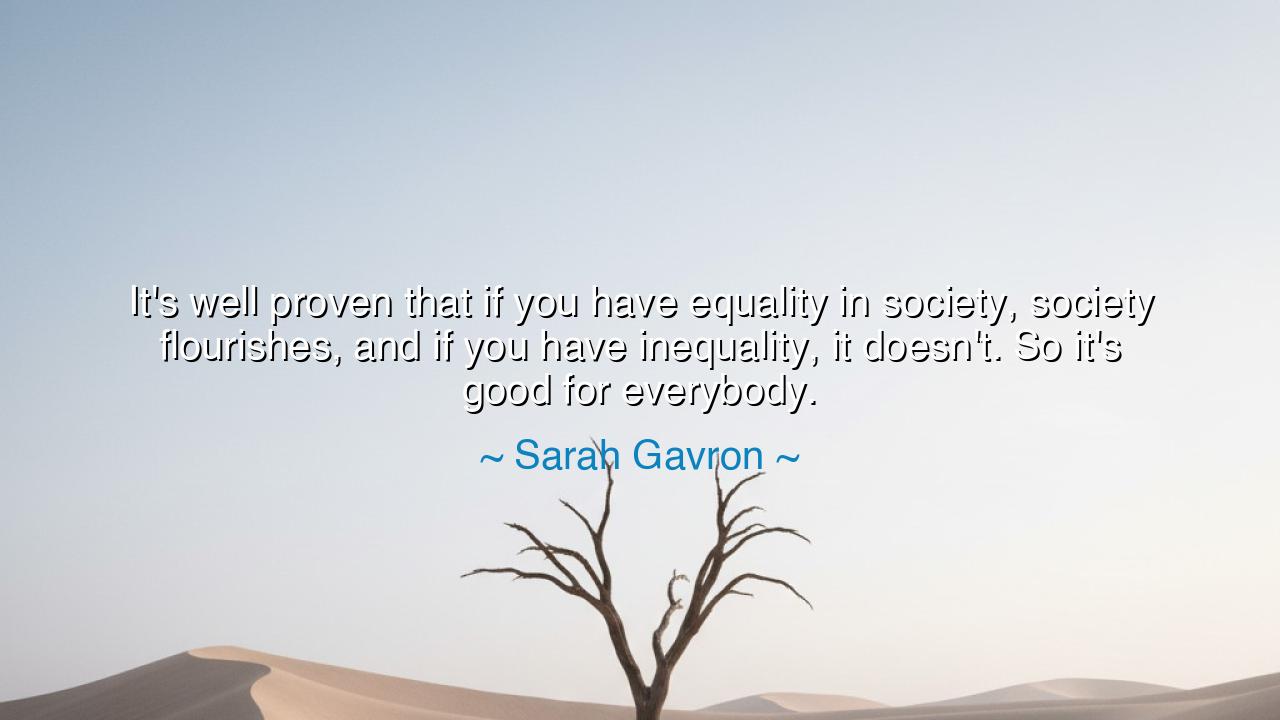
It's well proven that if you have equality in society, society
It's well proven that if you have equality in society, society flourishes, and if you have inequality, it doesn't. So it's good for everybody.






In the wise and steady voice of Sarah Gavron, filmmaker and storyteller of justice, we hear a truth both ancient and eternal: “It's well proven that if you have equality in society, society flourishes, and if you have inequality, it doesn't. So it's good for everybody.” Her words are not born from theory alone but from the living pulse of history itself—from the rise and fall of civilizations, from the triumphs of justice and the ruin of arrogance. In these few words, Gavron speaks not only of fairness but of survival; not merely of kindness but of wisdom. For she reminds us that equality is not charity—it is the soil in which every great people must root their future.
The meaning of her quote lies in its moral and practical clarity. Gavron proclaims that equality is not a gift granted to the weak by the strong—it is the foundation upon which the strength of all depends. When a society honors the dignity of each person—when men and women, rich and poor, ruler and worker, share in opportunity and respect—it becomes resilient, creative, and united. But when it allows inequality to fester, when it builds palaces for a few and prisons for many, when it measures worth by birth or power, it sows the seeds of its own undoing. The harmony of humanity is not sustained by domination but by justice. Equality is, therefore, not the dream of idealists alone—it is the architecture of peace.
To understand her words fully, we must turn to the origin of this truth in the chronicles of the world. Across time, the rise and fall of nations have proven Gavron’s wisdom. Ancient Athens flourished not because it was the richest, but because it dared to give voice to its citizens. Rome, too, prospered when it extended rights, but declined when greed and slavery corrupted its heart. In our own age, the revolutions of France, America, and countless others were born from the cry for equality—a cry that shook thrones and awakened freedom. And yet, even now, the same struggle continues, for the lesson, though clear, is easily forgotten: no nation can endure when it denies dignity to its people.
Consider the story of Emperor Ashoka of India, who began his reign in conquest and bloodshed. After witnessing the carnage of his own ambition, he turned to the path of compassion and equality. He renounced war, lifted the burdens of his people, and declared that all faiths and classes deserved respect. Under his rule, the empire flourished—not through force, but through fairness. Trade expanded, learning grew, and peace reigned. When Ashoka ruled with inequality, he gained territory but lost peace; when he ruled with equality, he gained a kingdom of hearts. His reign stands as proof of Gavron’s truth: equality uplifts the whole, while inequality poisons even the victorious.
Equality also frees the human spirit to create. When every voice is allowed to speak, invention blooms; when every mind is valued, wisdom multiplies. The artist, the farmer, the scholar, the dreamer—all contribute to the wealth of a just society. But where inequality reigns, fear stifles imagination, and talent is lost in the shadows. This is why Gavron’s words reach beyond politics—they speak to the essence of human potential. A flourishing society is not one that feeds only its powerful, but one that draws strength from the many hands that build it.
Yet, her quote carries also a warning. The ancient world, again and again, fell not from invasion but from injustice. Inequality corrodes the spirit of unity. It divides neighbor from neighbor, class from class, and generation from generation, until the nation’s soul collapses under its own pride. History teaches that the mightiest empires have crumbled because they forgot compassion, because they placed gold above goodness and privilege above purpose. Gavron reminds us that prosperity without equality is a tower built on sand—it stands tall for a moment, but it cannot weather the storms of time.
Therefore, O listener, take this lesson into your heart: if you would build something that lasts—be it a family, a nation, or a world—build it upon equality. Do not mistake equality for sameness; it does not mean we are all identical, but that each life holds equal worth. Let your actions be guided by justice: share opportunity, uplift the voiceless, listen where others are silenced, and speak when silence becomes consent. A society that honors equality honors itself; its strength becomes unbreakable, its peace unshakable.
And so remember this truth of Sarah Gavron—that equality is not merely for the oppressed, but for all who wish to live in peace. It is the light by which civilizations grow and the shield that guards their future. Where it reigns, humanity flourishes; where it falters, ruin follows. Therefore, let equality be your creed, and compassion your craft, so that your world, too, may flourish—and your legacy be written not in conquest, but in kindness.






AAdministratorAdministrator
Welcome, honored guests. Please leave a comment, we will respond soon